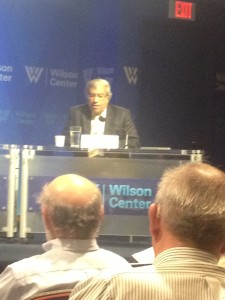
Khalil Shikaki spoke on the trends in his book, Arabs and Israelis: Conflict and Peacemaking in the Middle East, saying he has found the conflict easier to address today than 20 years ago.
WASHINGTON, DC: For students growing up in a backdrop of terror, the proper learning tool is crucial when it comes to teaching a subject like the Arab-Israeli conflict, experts say.
At the Woodrow Wilson International Center for Scholars, a group of professors recently evaluated a newly released textbook “Arabs and Israelis: Conflict and Peacemaking in the Middle East,” asking whether it brings the balanced viewpoint that is missing from the educational setting today. What they found? The book provides academic credibility in an environment overcrowded by media hype and community prejudices.
“I’m really impressed by the volume,” said Woodrow Wilson Center Vice President Aaron David Miller during the discussion. “I’m not sure anything has been attempted like this before.
The book is co-authored by a Palestinian, Israeli and Egyptian, each presenting their own narrative in order to develop a broader perspective. It is essentially meant to act as a guide, starting with some background information and then proceeding into each of the authors’ personal narratives. As a result, the authors believe the book has become an analytical tool for students when looking at important developments in the Arab world.
“It provides the students a sense of the most important developments in the history of the conflict,” said Shai Feldman, one of the book’s authors.
The professors were critical of textbooks today, saying in many ways the conflict has traveled from the battlefield to the classroom.
“Tell me what textbook you are using and I will tell you what your political inclinations are,” said Asher Kaufman, a history professor at the University of Notre Dame, during the discussion. He presented a problem that exists when a textbook presents one narrative.
Shibley Telhami, a University of Maryland peace professor, expanded on that point, saying, “It’s inevitable that the narratives themselves are politicized because people are fighting for support on their side.”
The authors of the latest textbook do not suggest solutions to the conflicts. Instead, the narratives are intended for students to unravel through the controversies and critically ponder a solution independently.
“You get a powerful flavor of the context about how these negotiations took place that doesn’t answer questions, but really starts a conversation,” said Telhami during the discussion.
“It’s really not a book as much as it a living instrument,” continued Miller.





